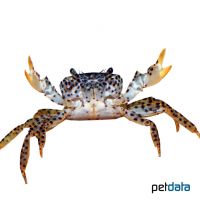Panther Crab (Parathelphusa pantherina)
| Panther Crab Parathelphusa pantherina | |
|---|---|
| Name | Panther Crab |
| Name Lat. | Parathelphusa pantherina |
| Family | Freshwater Crabs |
| Family lat. | Gecarcinucidae |
| Order | Decapods |
| Order lat. | Decapoda |
| Origin | Sulawesi |
| Habitat | Lake Matano |
| Diet | Algae, snails, crab food |
| pH | 7.5-8.5 |
| Behavior | Territorial |
| Keeping | Pair, group |
| Care Level | Moderate |
| Reproduction | Egg layer |
| Breeding | Difficult |
| Life Span | 3-5 years |
| Protection | No |
| Metric Units | |
| Size | 7-8 cm |
| Temperature | 26-30 °C |
| Hardness | 8-12 °dH |
| Aquarium | ~ 100 l |
| US Units | |
| Size | 3" |
| Temperature | 79-86 °F |
| Hardness | 142-214 ppm |
| Aquarium | ~ 25 gal |
Distribution and habitat
The purely aquatic panther crab is found exclusively (endemically) in Lake Matano on the island of Sulawesi (Indonesia). They mainly reside in the areas close to the shore, with soft, leaf-covered substrate.
Maintenance
They need a well structured aquarium with roots, stones and some plants as well as numerous hiding places (caves, perforated rocks, crab tubes, coconut shell). A dark substrate of sand or fine gravel covered with some foliage (e.g. sea almond tree, oak), some shaded light (floating plants) and slightly alkaline water is ideal.
No ammonia, ammonium and nitrite should be detectable in the water. The nitrate value should be below 50 mg/l. When choosing a filter, care should be taken to provide moderate water flow and to prevent animals from entering the filter. The lighting should correspond to the natural day-night rhythm of the animals.
Diet
The food supply consists of small snails and a special commercial dry food for crabs, supplemented with snails, live or frozen Artemia, mosquito larvae etc. and some vegetable food (algae leaves). Sinking dry food for fish, such as food tablets or granules, is also well accepted
They take only very small amounts of food, accordingly only small portions should be fed. Unaccepted food must be siphoned off after 2-3 hours. A regular and varied diet promotes the well-being of the animals.
Behaviour and compatibility
It is recommended to keep them in pairs or in a group in a species tank. Keeping a group is only possible in a much larger, richly structured tank. A socialization with fish, such as rainbow fish or barbs is well possible. Fish that are too small, or very slow swimming, may be considered prey
Basically, only mutually compatible species with similar demands on water condition and water temperature may be socialized.
Reproduction and breeding
There are isolated reports of successful breeding in the aquarium.
Important
The panther crab is an aquatic-only (aquatile) crab species that does not require a terrestrial part. It is a very lively crab whose carapace can have different shades of orange.
Each crab should have at least one cave of its own where it can hide and molt without disturbance.
The aquarium must be well covered or the water level lowered appropriately to prevent them from escaping.
The well-being of the animals should be checked regularly. Temperature should be checked daily, pH, hardness and nitrate levels at least fortnightly. Regular partial water changes are recommended, even if the contaminant level has not yet reached the upper limit. Sudden changes in water quality should be avoided. Newly introduced animals must be accustomed slowly to the water in the aquarium.
Further literature can be found in your pet store.
References
Text: petdata; Image: petdata
Source: ENGELMANN & LANGE (2011): Zootierhaltung - Tiere in menschlicher Obhut: Wirbellose, Verlag Harri Deutsch
